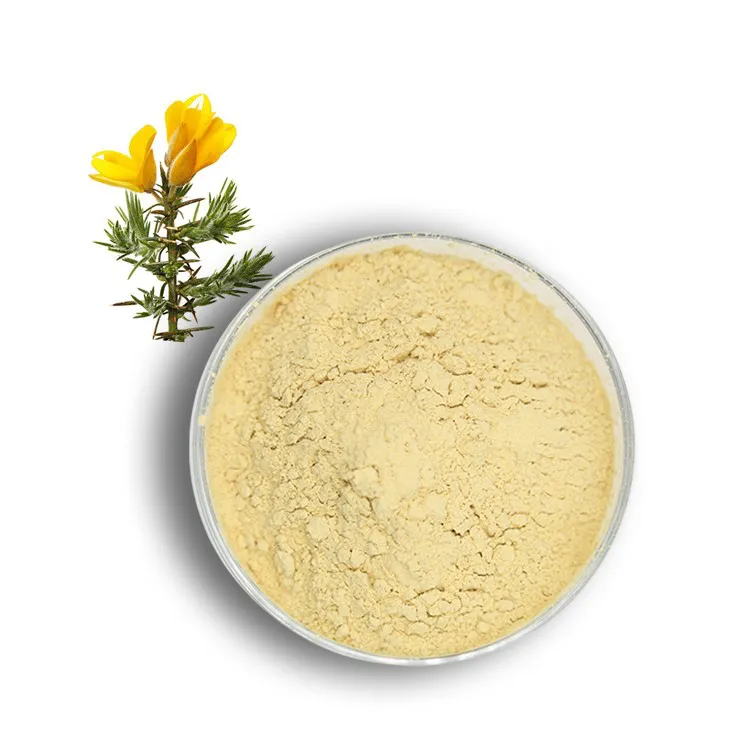- 0086-571-85302990
- sales@greenskybio.com
Genistein in China vs. the United States
2024-11-29

1. Introduction
Genistein, a natural isoflavone, has emerged as a compound of great interest in both China and the United States. This bioactive compound is known for its potential health - promoting properties. China, with its long - standing traditions in herbal medicine, and the United States, with its advanced scientific research infrastructure, approach Genistein from different perspectives. Understanding the differences and similarities in their approaches can provide valuable insights into the global utilization of this compound.

2. Genistein in Chinese Traditional Medicine
2.1. Source from Native Plants
In China, genistein can be sourced from various native plants. Plants such as soybeans are a rich source of genistein. The Chinese have been consuming soy - based products for centuries, and these products contain genistein in varying amounts. Additionally, other leguminous plants may also be sources of this compound. The traditional Chinese diet, which is rich in plant - based foods, provides a natural reservoir of genistein.
2.2. Role in Traditional Chinese Medicine
Genistein has been explored in traditional Chinese medicine for its potential health benefits. One of the main areas of interest is its anti - inflammatory properties. In traditional Chinese medicine theory, inflammation is often associated with an imbalance in the body's "Qi" and "Blood." Genistein is thought to help restore this balance. For example, it may be used in herbal formulas to treat conditions where inflammation is a factor, such as joint pain or certain skin disorders. However, these uses are often based on traditional knowledge and experience, and further scientific research is needed to fully understand the mechanisms involved.

3. Genistein in the United States: Modern Medical Research
3.1. Cancer Research
In the United States, a significant portion of scientific research on genistein focuses on its potential role in cancer treatment and prevention. Laboratory studies have shown that genistein may have anti - cancer properties. It may interfere with the growth and spread of cancer cells by various mechanisms. For example, it can modulate cell signaling pathways that are involved in cancer cell proliferation. Some research has also suggested that genistein may enhance the effectiveness of existing cancer therapies. However, clinical trials are still ongoing to determine its true efficacy in human cancer patients.
3.2. Dietary Supplement Development
Another area of focus in the United States is the development of genistein - based dietary supplements. Given its potential health benefits, there is an increasing interest in formulating supplements that contain genistein. These supplements are often marketed as a way to support overall health, especially for individuals who may not get enough genistein from their regular diet. However, the regulation of these supplements is a complex issue, as they need to meet certain safety and quality standards.

4. Research Directions
4.1. China
In China, current research directions on genistein are gradually moving towards a more scientific and evidence - based approach. While still building on traditional knowledge, researchers are using modern scientific techniques to study genistein. For example, they are exploring the molecular mechanisms underlying its anti - inflammatory effects. There is also an interest in studying how genistein interacts with other components in traditional herbal formulas. This could lead to the development of more effective herbal remedies based on a better understanding of genistein's role.
4.2. United States
In the United States, research is mainly focused on expanding the understanding of genistein's role in modern medicine. This includes further investigations into its anti - cancer properties, as well as exploring its potential applications in other areas such as cardiovascular health. There is also a growing interest in personalized medicine, and researchers are looking at how genistein may affect different individuals based on their genetic makeup. For example, some studies are exploring whether certain genetic variants may influence an individual's response to genistein - based therapies.

5. Availability in Natural Sources
5.1. China
In China, as mentioned earlier, genistein is available from common food sources such as soybeans and other legumes. These are staple foods in many parts of the country, especially in rural areas. Additionally, some wild plants may also contain genistein, although their consumption may be more limited. Traditional Chinese medicine herbs that contain genistein are also widely available in Chinese herbal medicine markets. However, the concentration of genistein in these natural sources can vary depending on factors such as plant variety, growing conditions, and processing methods.
5.2. United States
In the United States, soy - based products are also a major source of genistein. However, the consumption patterns may be different compared to China. In addition to soybeans, some other imported plant - based foods may also contain genistein. With the growing popularity of Asian cuisines in the United States, the availability of genistein - rich foods has increased to some extent. However, dietary supplements are also a significant source of genistein for those who are interested in its potential health benefits and may not consume enough from natural food sources.
6. Regulatory Stances
6.1. China
In China, the regulation of genistein - related products is part of the broader regulatory framework for traditional Chinese medicine and food products. For traditional Chinese medicine herbs containing genistein, they are subject to strict quality control and standardization requirements. These requirements ensure that the herbs are safe for consumption and have consistent quality. When it comes to genistein - containing food products, they also need to meet food safety regulations. For example, if genistein is added to a functional food, it must be within the allowed limits and properly labeled.
6.2. United States
In the United States, the regulation of genistein - based products is more complex. Dietary supplements containing genistein are regulated under the Dietary Supplement Health and Education Act (DSHEA). Under this act, supplement manufacturers are responsible for ensuring the safety of their products before they are marketed. However, the FDA does not pre - approve dietary supplements in the same way it does for drugs. For genistein used in research, especially in the context of cancer research, it is subject to different regulatory requirements depending on the stage of research and whether it is being used in a clinical trial.
7. Conclusion
Genistein is an important bioactive compound that is being studied and utilized in both China and the United States. In China, the traditional knowledge of herbal medicine provides a foundation for exploring genistein's potential, while in the United States, modern scientific research drives the exploration of its applications in medicine and dietary supplements. The differences in research directions, availability in natural sources, and regulatory stances reflect the unique characteristics of the two countries' healthcare and research landscapes. Future collaborations between China and the United States in the field of genistein research could potentially lead to a more comprehensive understanding of this compound and its potential benefits for human health.
FAQ:
What are the main research directions of genistein in China?
In China, given its rich herbal medicine traditions, the main research direction of genistein is often related to exploring its potential health benefits in traditional Chinese medicine, such as anti - inflammation, through the study of certain native plants that may be sources of genistein.
What are the main research directions of genistein in the United States?
In the United States, the scientific research on genistein mainly focuses on its applications in modern medicine. For example, it is widely studied in cancer research and the development of dietary supplements.
What are the common natural sources of genistein in China?
In China, genistein may be sourced from certain native plants. However, specific plants often vary depending on different regions and traditional medicine knowledge. Some plants in traditional Chinese medicine might be potential sources of genistein.
What are the regulatory stances towards genistein in the United States?
In the United States, regulatory stances towards genistein are mainly based on its applications in modern medicine. For dietary supplements, there are regulations regarding their safety, labeling, and manufacturing processes. In cancer research, it is also subject to the regulations and ethical guidelines of scientific research.
How does the research on genistein in China contribute to global understanding?
The research on genistein in China, especially its exploration in traditional Chinese medicine, can provide different perspectives on its potential health benefits. By studying native plants as sources of genistein and its traditional uses, it can add to the global knowledge base about this bioactive compound, potentially inspiring new research directions and applications in other parts of the world.
Related literature
- Genistein: A Review of Its Potential Health Benefits in Traditional Chinese Medicine"
- "Genistein in Modern American Medicine: Research and Regulatory Aspects"
- "Comparative Analysis of Genistein Research between East and West"
- ▶ Hesperidin
- ▶ citrus bioflavonoids
- ▶ plant extract
- ▶ lycopene
- ▶ Diosmin
- ▶ Grape seed extract
- ▶ Sea buckthorn Juice Powder
- ▶ Beetroot powder
- ▶ Hops Extract
- ▶ Artichoke Extract
- ▶ Reishi mushroom extract
- ▶ Astaxanthin
- ▶ Green Tea Extract
- ▶ Curcumin Extract
- ▶ Horse Chestnut Extract
- ▶ Other Problems
- ▶ Boswellia Serrata Extract
- ▶ Resveratrol Extract
- ▶ Marigold Extract
- ▶ Grape Leaf Extract
- ▶ blog3
- ▶ blog4
-
Standard - process green tea extract.
2024-11-29
-
100% Organic Calendula Extract.
2024-11-29
-
Cat Claw Extract
2024-11-29
-
Aguaje Extract
2024-11-29
-
Troxerutin
2024-11-29
-
Genistein
2024-11-29
-
Bamboo Leaf extract
2024-11-29
-
Longan Extract
2024-11-29
-
Almond Extract Powder
2024-11-29
-
Baicalin
2024-11-29
-
Black Pepper Extract
2024-11-29
-
Coix Seed Extract
2024-11-29




















